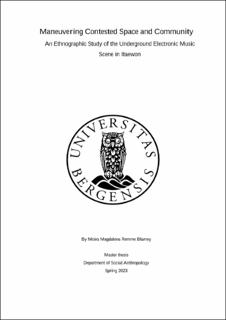| dc.description.abstract | This thesis examines the dynamics of the underground electronic music scene in Itaewon, Seoul, South Korea, within the framework of contested space. Building upon the theories of Henri Lefebvre, Anthony Cohen, and Sarah Thornton, this research explores the formation of communities, spatiality, and the impact of the COVID-19 pandemic on Itaewon’s cultural landscape. Drawing from Lefebvre's reflections on spatial contestation, the study investigates how physical and symbolic spaces in Itaewon shape the experiences and interactions within the underground music scene. It delves into the significance of venues such as clubs and bars as cultural hubs, where diverse groups come together to express themselves and forge communities. Informed by Cohen's theory of community, the research sheds light on the social bonds, shared practices, and sense of belonging that emerge within the underground electronic music scene. It explores the collaborative endeavors, mutual support, and navigation of the complexities of the urban environment and the covid pandemic through stories from interlocuters and ethnography. Thornton's work on club culture provides insights into the role of music and cultural practices in shaping the experiences of individuals within the Itaewon underground club scene. It examines the intersections between music, and identity, highlighting the ambiance and social dynamics of the underground electronic music community. Furthermore, the study delves into the impact of the COVID-19 pandemic on the underground music scene in Itaewon. It delves into the myriad challenges artists, organizers, and participants confront as they navigate the constraints imposed by restrictions, strive to sustain connections, explore the quest for safe spaces, and seek out alternative pathways for creative expression. By integrating these theoretical perspectives, this thesis provides a comprehensive understanding of the underground electronic music scene in Itaewon, emphasizing its significance within the LGBTQ+ community. It illuminates the transformative power of inclusive cultural spaces, the role of music in identity formation, and the resilience of communities in the face of adversity. The findings contribute to urban anthropology and our understanding of contested spaces, cultural expressions, and the ongoing evolution of underground scenes. | |
